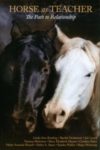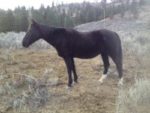NUTRITION- An Introduction to the Use of Herbs in Horses Diets
Article written by: Dr Joyce Harman
Summary
Herbal medicine is being used with increasing frequency. Many people are unaware of the best way to use herbs, or what conditions can be treated. This article is an introduction to the many aspects of the use of herbs in horses with discussion about some specific herbs useful for older horses. Over time I will publish more details about herbal medicine and individual herbs.
An Introduction to the Use of Herbs
Horse owners are becoming increasingly interested in natural medicines and herbal medicine in particular. There is much lack of knowledge about herbal products in general leading people to add herbs to everything they do, without regard to the correct use. Herbs are powerful medicines, consequently they can be misused; the misuse of herbs leads to reports of negative effects. In fact, if herbs are used correctly, as they have been for many hundreds of years, they are a very safe and efficacious form of treatment.
Despite the increasing use of drugs in our society, chronic disease continues to be a problem, and is in fact an increasing problem. Herbal medicine offers a broad spectrum of choices for treatment.
Animals in nature have been observed eating a great variety of plants, especially when they are ill. Horses, in particular are herbivores by nature and eat herbs every day while grazing. A new branch of science called zoopharmacognosy involves the study of animals and their natural ability to select plants and herbs according to their needs and particular illnesses.
Horses will also naturally select from free-choice minerals as long as they are not too sick to sense their needs through instinct and odor recognition. Conventional nutrition research reports that no species can accurately select free-choice minerals. However, upon observation it becomes apparent that the seasonal variations in mineral and vitamin consumption are significant. For example, in the flood-stricken mid-western United States several years ago, horses with free-choice selections of minerals and vitamins ate large quantities of B vitamins during the summer when they would normally get most of the B vitamins they needed from the pasture. When the hair coat changes in the spring and fall, horses offered free-choice sulfur along with other free-choice minerals will eat extra sulfur. Sulfur is used in the manufacture of hair in the sulfur-containing amino acids.
Herbal supplementation can be beneficial to horses when approached in a scientific and careful manner. Perhaps one of the more difficult aspects of herbal supplementation on a regular basis is that herbs work best if they are not given everyday of the horse’s life. The consumer has unfortunately become accustomed to feeding supplements on a daily basis whether they are needed or not. After an initial period of continuous treatment (perhaps 3 months), long term tonic formulas of herbs are best used perhaps 6 days a week, giving the body one day to rest. Alternately, some horse do well if the formula is given 3 weeks out of the month, again giving the body time to heal or rest in between being stimulated with the herb.
Research on herbs
Currently there are well over twenty scientific journals worldwide publishing research concerning herbs. Pharmaceutical companies are researching herbs since many of our current drugs are derived from herbs. Pharmaceutical companies are examining individual active ingredients and isolating them as drugs. Drugs generally have side effects, while herbal medicine has traditionally combined whole herbs into formulas relying on their synergistic effects to achieve gentle results virtually free from side effects.
Much of the herbal information has been collected for centuries in an uncontrolled, unscientific manner when compared to our modern standards of research. The fact that the same herbs have been documented by many cultures to have similar actions and uses is an indication of the efficacy of herbal treatments. Much of the published scientific research is from the 1940’s to the 1960’s and early 1970’s.
Herbs of value for the older horse
There are several herbs useful for addressing the problems seen in older horses. There are no known contraindications to theses herbs and they have all been used for long-term supplementation with no reports of toxicity. Research supports the use of these herbs for certain indications, and since there is research information available, label claims can be justified, if desired.
The main systems to address in the older horse are the digestive tract, the immune system and the musculoskeletal system.
Licorice
Licorice has been used traditionally as a harmonizing agent in almost all Chinese herbal formulas for 2000 years. Current research supports the safety of the herb and licorice is commonly used as a flavoring agent in sweets. Licorice has been shown in hundreds of studies to be useful for protecting and healing distressed mucous membranes of the digestive tract. It also has well-documented anti-inflammatory effects in arthritis probably due to the release of endogenous corticosteroids.
Dandelion
Dandelion has been used in liver-related disorders for centuries, both by the Chinese and the Europeans. Dandelion stimulates liver activity, encouraging the elimination of urea and other toxins in the blood. The United States Department of Agriculture analysis shows that dandelion is richer in vitamin A than carrots and exceeds the vitamin B, C and D content of many other vegetables. So, let your horses eat the dandelions in your lawn and avoid the toxic chemical sprays.
Nettle
The common stinging nettle is considered an important tonic herb by many herbalists. Research has shown that is has immune stimulating effects, increasing the activity of human lymphocytes, one of the important white blood cells.
Peppermint
Peppermint is extremely well known as a remedy for stomach ands intestinal disorders, hence the tradition of having a mint after dinner. The essential oils present in peppermint normalize digestive tract function. The oils also have antiulcer and anti-inflammatory activity. Peppermint has been shown to have antibacterial, antifungal and antiviral properties. However, the peppermint in sugary candies only has a few of these properties and many candies are made with artificial peppermint flavor. Try growing some peppermint and using that as a treat for your horse.
Garlic
Garlic has a strong reputation for it ability to strengthen the body’s immune system and aid in the resistance of disease. Garlic is surprisingly well tolerated by horses even in its raw form. Many people find that feeding garlic helps keep the flies away from the horses (not to mention that the barn smells like an Italian restaurant.
Burdock Root
Burdock has centuries of documented use for arthritic conditions, however the actual research on the mechanisms of action appears to be limited. So, those burrs do have a use!
Conditions treated with herbs
Many of our most common conditions can be treated with herbal formulas. Arthritis is one of the most common and responsive conditions and there are many options from Chinese herbal formulas, western herbal formulas, and single herbs such as Devil’s Claw or Meadowsweet that work well for some horses. Often the formulas give the best responses, especially the ones with highly qualified herbalist creating them.
Respiratory problems, mare reproductive problems, behavior problems and nervousness are all conditions that respond well to herbal treatment. Some skin problems can respond well.
There are also many topical herbal formulas on the market. Some are for wound healing such as Calendula, aloe vera, tea tree oil, chaparral, yarrow, echinacea and many more. Other topicals are for soreness and injuries, such as Arnica, lavender, comfrey (which grows prolifically in your back yard; the leaves can just be crushed and put onto bruises), as well as many Chinese herbal formulas. The Chinese herbal formulas are often very powerful when used with injuries.
Digestion and absorption
Clinical experience as well as research has demonstrated the importance of having a healthy digestive tract with a good balance of microflora. It is a good idea to put horses on a probiotic for a month or two when you start with an herbal product to be sure the digestive tract is functioning at its best. The fermented products act more by stimulating good bacterial growth than they do by just replacing the bacteria . Other products add good bugs to the gut, and it is best to use ones that are specific to the horses.
Sources of herbs
The quality of herbs is an important issue. Poor quality herbs do not work well and manufacturers consistently delude themselves into using the cheaper herbs with consequent poor clinical results. The companies that supply the herbs we carry in the clinic and on the web site all use high quality ingredients and have excellent quality control.
About Joyce
Be sure to visit her website www.harmanyequine.com
Dr. Joyce Harman graduated from Virginia Maryland Regional College of Veterinary Medicine in 1984 with an interest in acupuncture and alternative medicine. She went to England, the Ireland to study equine exercise physiology and sports medicine, always looking for a better, safer way to treat and train horses.
Upon her return to the United States, she went to work in New Jersey for a large equine practice, with all the latest equipment. However, as Dr. Harman began to find out, many animals still could not be helped and she began to use acupuncture extensively to resolve cases that were not responding to conventional medicine. Dr. Harman became a Certified Veterinary Acupuncturist in 1990.
She decided to open her own practice and do just acupuncture, so she moved to Virginia in 1990 and opened Harmany Equine Clinic. In 1994 she became a Certified Veterinary Chiropractor and also completed an advanced homeopathic course for veterinarians. Along the way she has taken many other courses in holistic medicine for animals.


